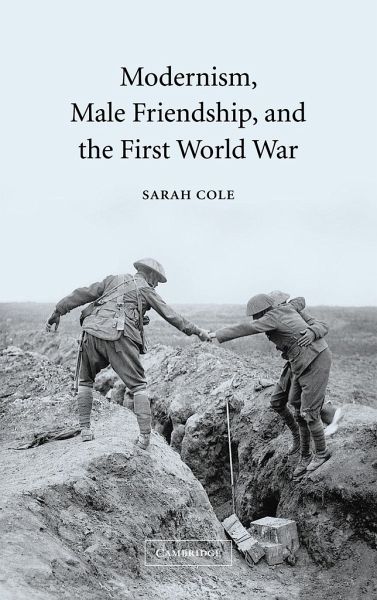
Modernism, Male Friendship, and the First World War
Versandkostenfrei!
Versandfertig in 1-2 Wochen
103,99 €
inkl. MwSt.
Weitere Ausgaben:

PAYBACK Punkte
52 °P sammeln!
Short description/annotationCole examines the rich literary and cultural history of masculine intimacy in the twentieth century.Main descriptionSarah Cole examines the rich literary and cultural history of masculine intimacy in the twentieth century. Cole approaches this complex and neglected topic from many perspectives - as a reflection of the exceptional social power wielded by the institutions that housed and structured male bonds; as a matter of closeted and thwarted homoerotics; as part of the story of the First World War. Cole shows that the terrain of masculine fellowship provides an i...
Short description/annotation
Cole examines the rich literary and cultural history of masculine intimacy in the twentieth century.
Main description
Sarah Cole examines the rich literary and cultural history of masculine intimacy in the twentieth century. Cole approaches this complex and neglected topic from many perspectives - as a reflection of the exceptional social power wielded by the institutions that housed and structured male bonds; as a matter of closeted and thwarted homoerotics; as part of the story of the First World War. Cole shows that the terrain of masculine fellowship provides an important context for understanding key literary features of the modernist period. She foregrounds such crucial themes as the over-determined relations between imperial wanderers in Conrad's tales, the broken friendships that permeate Forster's fictions, Lawrence's desperate urge to make culture out of blood brotherhood and the intense bereavement of the war poet. Cole argues that these dramas of compelling and often tortured male friendship have helped to define a particular spirit and voice within the literary canon.
Table of contents:
Acknowledgments; Introduction: i. Argument: the organization of intimacy, ii. Definitions and choices: modernism, modernity, literary authority, iii. Organizations: four sites of masculine bonding; 1. Victorian dreams, modern realities: Forster's classical imagination: i. Hellenism and the beautiful body: Carpenter, Pater, Symonds, ii. The fall of Hellenism: Forster's modern disaffection, iii. A Passage to India and the failure of institutions; 2. Conradian alienation and imperial intimacy: i. Friendship's dramatic demise: Heart of Darkness and Under Western Eyes; ii. From system to solipsism: Lord Jim, iii. Homoerotic heroics, domestic discipline: Conrad and Ford's Romance; 3. 'My killed friends are with me where I go': friendship and comradeship at war: i. War discourse: friendship and comradeship, ii. The major war poets: intimacy, authority, alienation, iii. Post-war articulations: lost friends and the lost generation; 4. 'The violence of the nightmare': D. H. Lawrence and the aftermath of war: i. Bodies of men: the landscape of post-war England, ii. Desire and devastation: male bonds in D. H. Lawrence; Notes.
Cole examines the rich literary and cultural history of masculine intimacy in the twentieth century.
Main description
Sarah Cole examines the rich literary and cultural history of masculine intimacy in the twentieth century. Cole approaches this complex and neglected topic from many perspectives - as a reflection of the exceptional social power wielded by the institutions that housed and structured male bonds; as a matter of closeted and thwarted homoerotics; as part of the story of the First World War. Cole shows that the terrain of masculine fellowship provides an important context for understanding key literary features of the modernist period. She foregrounds such crucial themes as the over-determined relations between imperial wanderers in Conrad's tales, the broken friendships that permeate Forster's fictions, Lawrence's desperate urge to make culture out of blood brotherhood and the intense bereavement of the war poet. Cole argues that these dramas of compelling and often tortured male friendship have helped to define a particular spirit and voice within the literary canon.
Table of contents:
Acknowledgments; Introduction: i. Argument: the organization of intimacy, ii. Definitions and choices: modernism, modernity, literary authority, iii. Organizations: four sites of masculine bonding; 1. Victorian dreams, modern realities: Forster's classical imagination: i. Hellenism and the beautiful body: Carpenter, Pater, Symonds, ii. The fall of Hellenism: Forster's modern disaffection, iii. A Passage to India and the failure of institutions; 2. Conradian alienation and imperial intimacy: i. Friendship's dramatic demise: Heart of Darkness and Under Western Eyes; ii. From system to solipsism: Lord Jim, iii. Homoerotic heroics, domestic discipline: Conrad and Ford's Romance; 3. 'My killed friends are with me where I go': friendship and comradeship at war: i. War discourse: friendship and comradeship, ii. The major war poets: intimacy, authority, alienation, iii. Post-war articulations: lost friends and the lost generation; 4. 'The violence of the nightmare': D. H. Lawrence and the aftermath of war: i. Bodies of men: the landscape of post-war England, ii. Desire and devastation: male bonds in D. H. Lawrence; Notes.




